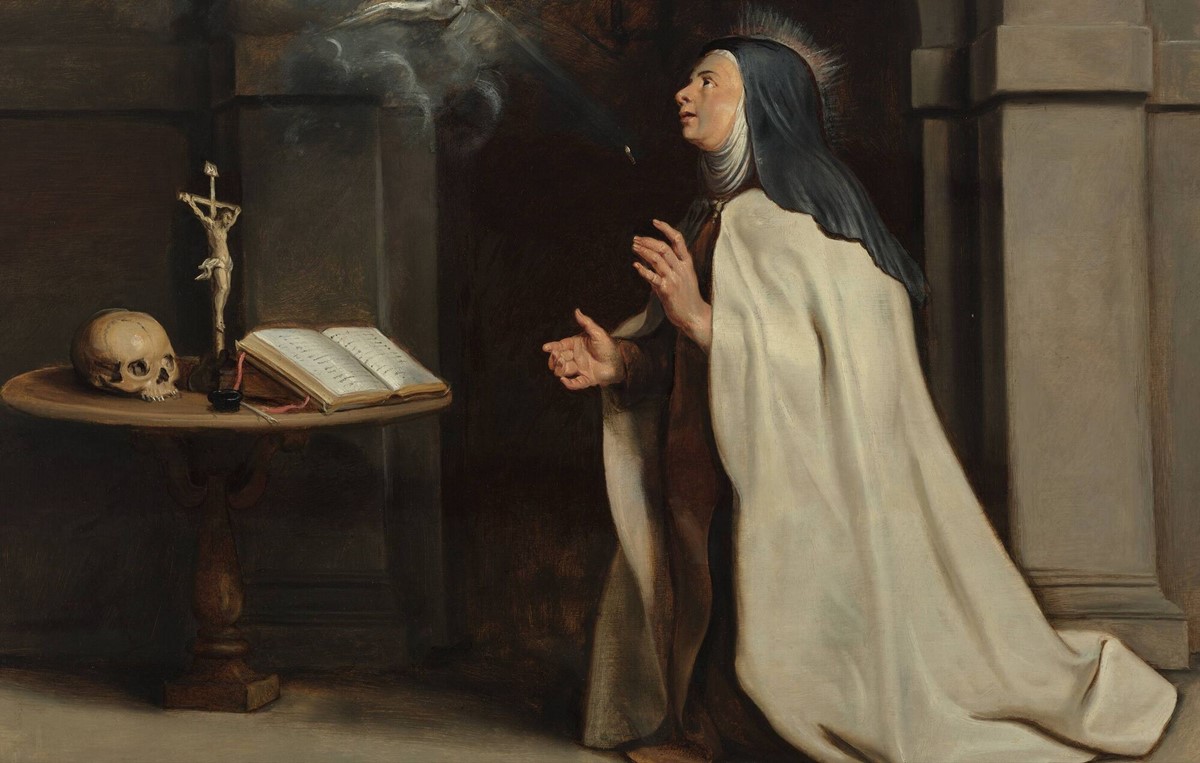 |
| Saint Teresa of Avila's Vision by Peter Paul Rubens, 1612-1614 [Public Domain via Wikimedia]. |
 The Interior Castle by Teresa of Ávila
The Interior Castle by Teresa of ÁvilaMy rating: 5 of 5 stars
It took me some time to get through this masterpiece by Saint Teresa of Avila. Written in 1577 during the Spanish Inquisition, I found it difficult to get through the self-effacing humility of the good saint and had to take several breaks.
One of the blessings/curses of the Dover Thrift Editions is that the books are deceptively small, and while this book is only 168 pages, the pages are dense in words. It is a blessing that the books look short, and a curse because they aren't. Yet they are very affordable and the deception encourages me to read books I would otherwise put off for later. Like Karl Marx's Capital, sitting near me (and almost as long as Tolstoy's War and Peace at some 1,361 pages.).
I found a few things about Interior Castle confusing. St Teresa writes there are seven mansions that the soul passes through (one chooses to enter the crystal castle from the wilderness). As one enters the first mansion, some of the critters get in with you. You can see both the light of the innermost mansion, yet you can still see the dark.
St Teresa tells of the experiences of the soul progressing to the seventh mansion where the soul is at one with God. Although the development of the soul as it progressed was obvious, I am still in the dark as far as knowing which mansion one might be in at any given time, if at all.
St Teresa writes for other nuns, and while I understand that this is a modern translation, it is interesting how she frequently asks the reader to excuse her stupidity in being unable to explain things.
Clearly, the book was not written in one sitting, and often St Teresa admits that she cannot recall what or if she mentioned something in a previous chapter, and that she would not re-read what she had written. This is clearly not a first draft, however, and this edition includes footnotes that indicate what was a marginal comment, with alternative wordings, additions, or omissions from one of the two "learned men" St Teresa had correct her drafts. Such caution was prudent during the Spanish Inquisition, indeed.
For many pages I made no notes, and then numerous notes in a handful of pages. St Teresa covers the importance of self-knowledge, of learning, of humility, and raises an interesting question of the soul versus the spirit. While she does not give a definitive comparison, she suggests that the soul and the spirit are closely intertwined, but are not necessarily the same thing. I have often wondered about this difference.
One could argue that the ideas of Voltaire, Benjamin Franklin, James Allen, and Stephen Covey came from this work. St Teresa confirms the theme of Candide, Franklin's virtues, James Allen's "he who conquers self conquers the universe", and Stephen Covey's "Circle of Influence" as principles for living the interior life.
I read this book because of the title, hoping to find something more about the "inner citadel" the Stoics spoke of, and others who have used "interior castle" to mean something similar. St Teresa puts a different bent on the Stoic idea, but one can see the influence of the Stoics on Christian thought.
There are two main lessons St Teresa has confirmed for me. First:
...try to be least of all... and your foundation will be so firmly laid that your Castle will not fall.
And second:
...unless you strive after the virtues and practice them, you will never grow to be more than dwarfs.
Further, St Teresa provides a quote which goes a long way to explain what I refer to in my leadership teaching as the "duty cycle" that prevents people from realising their goals:
...the devil sometimes puts ambitious desires into our hearts, so that, instead of setting our hand to the work which lies nearest us, and thus serving Our Lord in ways within our power, we may rest content with having desired the impossible.
Finally, a friend once asked about the Delphic maxim "Know Thyself" and that, despite having been told by others that the phrase appeared in the Holy Bible, it doesn't (and it really doesn't), this is the earliest Christian reference to the Delphic maxim I have encountered to date. Whether this was a result of the work of the Toledo School of Translators is something I hope to investigate further.
View all my reviews
 Donate
Donate





